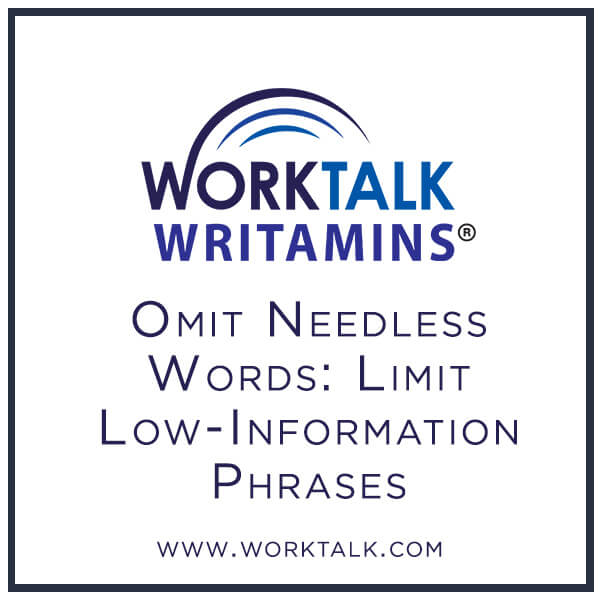
“Make every word tell.”
Strunk and White, The Elements of Style
In preparing for a recent writing training, I received 60 pages of sample documents. I found myself writing, “omit needless words” at least once on every page, as writers wrote sentences like “The company frequently from time to time receives discounts on its products.” and “The relationship first began when we met with the prospect in January 2014.” Yikes! These writers had literary atherosclerosis, with the sludge from excess words blocking the flow of meaning as their ideas struggled to reach the reader.
Why should you omit needless words? Shorter sentences are easier to read and understand than long ones. Every word that does not carry its weight adds to your word count. Just as we trim the fat from meat to make it healthier for us to eat, we need to trim the needless words from our sentences in order to write more clearly.
Strive for an average sentence length of around 20 words or fewer. (You can see your average words per sentence by running the Check Readability Statisticsfunction on MS Word.) Each word in each sentence should be there for a reason. Learn to spot unnecessary words and weed them out.
Low information Content (LIC) words and phrases make your writing seem blurry and indefinite. Rather than defaulting to a phrase you’ve used a hundred times before, use new phrases and words. If you can’t think of something new, then simply say what you have to say and don’t try to get fancy. Your readers will thank you.
Here are a few common LIC phrases, along with suggestions for replacing them.
On a … basis
This phrase is usually unnecessary. Just say what the basis is.
Richard’s wife, Susan, is the person operating this business on a daily basis.
Better: Richard’s wife, Susan, operates the business daily.
The CEO meets with customers on a quarterly basis to discuss trends and designs.
Better: The CEO meets with customers quarterly to discuss trends and designs.
Utilized
It is nearly always better to use used in place of the stodgy utilized. Often, the word is not necessary at all.
The loan will be utilized for short-term working capital needs.
Better: The loan will be used for short-term working capital needs.
The increase will be utilized to provide the necessary support for the company to complete an equipment purchase for $130,000.
Better: The increase will enable the company to purchase equipment for $130,000.
The fact that
The fact is usually unnecessary.
The main reason for the reduced loan request is the fact that revenues have increased.
Better: The main reason for the reduced loan request is that revenues have increased
In regards to
Frederick Jones of Jones Mortgage contacted me in regards to providing financing for the purchase.
Better: Frederick Jones of Jones Mortgage contacted me about providing financing for the purchase.
In regards to the A/P for the past 90 days,…
Better: Regarding the A/P for the past 90 days,…
In receipt of
We are in receipt of the above-mentioned notice from the EDD regarding late payment.
Better: We have/we received the above-mentioned notice from the EDD regarding late payment.
Irregardless
Never use this word.
At this point in time, having utilized the advice and information in the present Writamin, it is my hope that you feel you are in receipt of useful, actionable knowledge which will give you the opportunity to reduce the number of unnecessary words that do not add significantly to the meaningfulness of your prose sentences.
If you would like to receive a comprehensive list of LIC phrases and cliches, email me and I will send it to you.
© Elizabeth Danziger 2015
